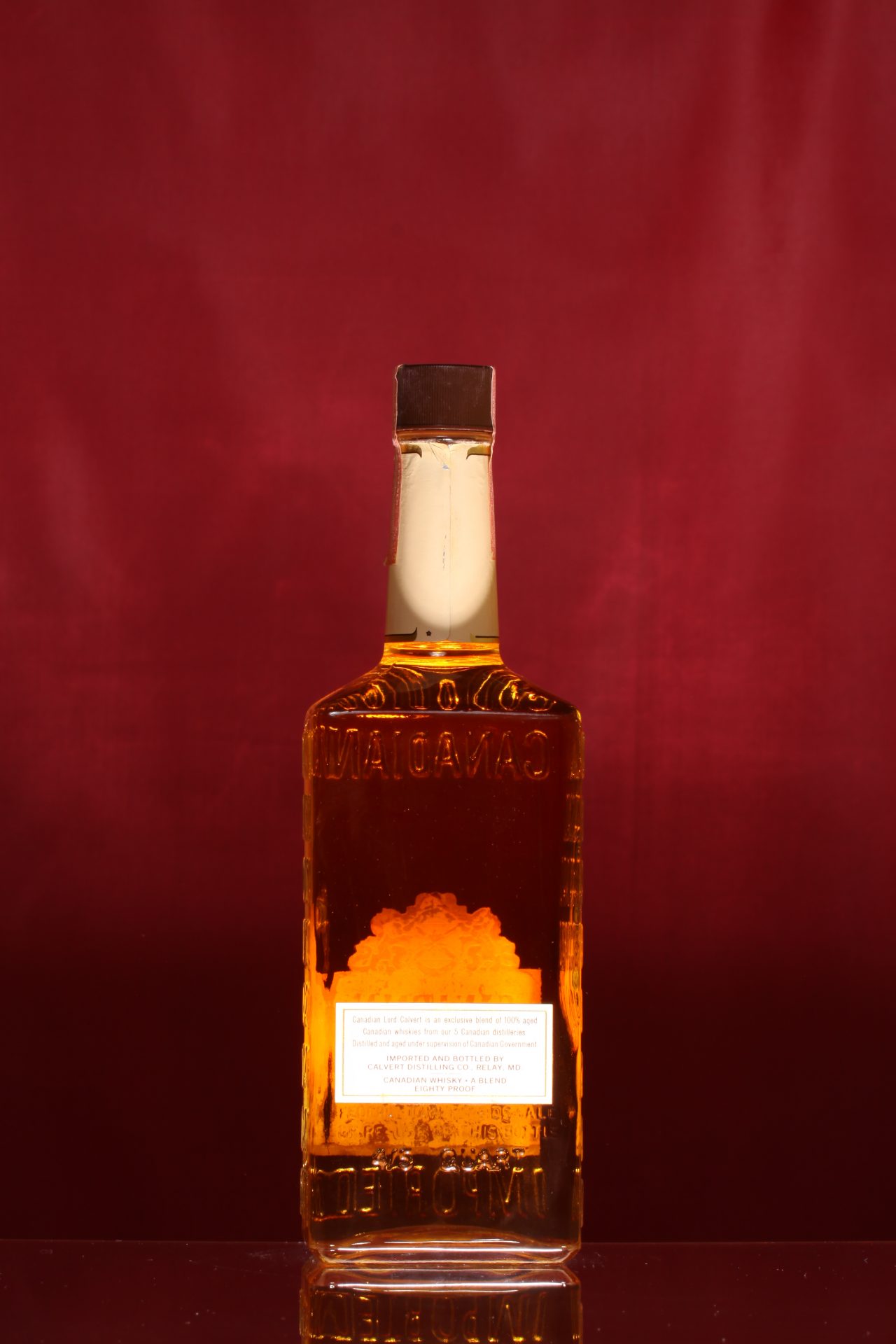CANADIAN LORD CALVERT
| Type: | WHISKEY CANADIAN |
| Flavor: | Canadian Blended |
| Made From: | Corn, Rye & Barley Malt |
| Produced By: | CALVERT DISTILLERS CO. |
| Origin: | Canada |
| Proof: | 80 |
| Age: | 0 |
| Importer: | CALVERT DISTILLING CO |
| Location: | Relay, Md. |
In 1889, Yechiel Bronfman, fleeing anti-Semitic pogroms in Bessarabia, arrived in Canada with his young family in tow. The family made its first Canadian home on the prairies where Bronfman, who had been a thriving tobacco farmer in Bessarabia, hoped to repeat his success as a farmer. He quickly learned, however, that the harsh prairie climate was quite unsuitable for tobacco. After a number of financial setbacks and successes in other ventures, including the liquor trade, the Bronfmans, whose name means ‘liquor man’ in Yiddish, eventually settled in Montreal.
In 1924, prompted by their already considerable success as rectifiers, the younger generation of Bronfmans built their first real distillery in the Montreal suburb of Lasalle. The Lasalle distillery, coupled with a Waterloo, Ontario distillery, called Seagram’s, which they purchased in 1928, quickly became the cornerstones of one of the world’s largest distilling empires. But despite the eventual pan-global network of Bronfman-owned distilleries, it was the Seagram name that stuck and remains most firmly associated with Canada.
In 1934, as Seagram’s, the Bronfman brothers acquired Maryland Distillers Inc. of Relay, Maryland and immediately set to improving the quality of its whisky. At the time, Maryland Distillers was selling un-aged American spirit, calling it Lord Calvert Whiskey. Sam Bronfman was determined to make low-quality, Prohibition-era whisky a thing of the past, so he immediately began adding Canadian whisky to Lord Calvert to improve the flavour, until properly-aged American distillates would become available. In 1939, with supplies of aged American whisky on the rise, blenders at Seagram’s Baltimore plant completely re-formulated Lord Calvert as a premium American blend.
Over the years that followed, the Calvert label, and the whisky itself, went through numerous iterations and was sold as Lord Calvert, Calvert Special, Calvert Reserve, Calvert Extra, and a 100% Canadian version called Lord Calvert Canadian. There were also numerous variants developed for regional markets. Sorting them all out now is no easy task, but it seems that Calvert Special and Calvert Reserve were introduced as American blends when sufficient aged American whisky became available after Prohibition. Although they were very well received, by the 1960s, drinkers were demanding lighter whiskies, and the bourbon and rye-rich Calvert Reserve had slipped from sales of over two million cases to fewer than 1.2 million cases annually.
Calvert chief blender, Russ McLauchlan and Seagram’s president Edgar Bronfman decided that rather than reformulate the blend they would simply withdraw it and replace it with another. The result was Calvert Extra, a lighter American blended whisky which soon had sales exceeding 2.3 million cases. It was a gamble that paid off well. Then, in 1964 Bronfman and McLauchlan developed an all-Canadian version called Lord Calvert Canadian. Thanks to stringent labeling laws we can be confident that Lord Calvert Canadian is, and always was the real thing ‘“ real Canadian whisky, all of it aged for a minimum of three years.
In 1991, Seagram’s sold the Lord Calvert Canadian brand to Jim Beam so Seagram’s could shift its focus to its premium brands, including Crown Royal. As a result, Calvert Canadian is now a Beam Global brand, but the whisky in the historic bottle reviewed here was indeed produced at Seagram’s Laval distillery more than thirty years ago now, at some time during the late 1970s or early ’80s. After being distilled, aged and blended in Laval, the whisky was shipped in bulk to Seagram’s plants in the United States where it was bottled and sold by ‘Calvert Distillers.’ Calvert, you see, was managed then as a separate Seagram brand, with its own sales and distribution organizations.


